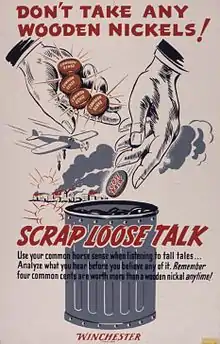Wooden nickel
In the United States, a wooden nickel is a wooden token coin, usually issued by a merchant or bank as a promotion, sometimes redeemable for a specific item such as a drink.

Scrip and tokens have often been issued locally in times of severe economic distress such as financial crises and the Civil War. During the Depression, a local bank in Tenino, Washington, issued emergency currency printed on thin shingles of wood.[1] Blaine, Washington, soon did the same with both flat scrip and, in response to requests generated by news and word of mouth, coins that included a 5-cent piece.[2] The Chicago World's Fair in 1933 issued wooden nickels as souvenirs, and the tradition of wooden nickels as tokens and souvenirs continues to the present day.[3]
In more recent times, wooden nickel trading has become more popular. Individuals can have their own personalized token made and then trade with others who also have had their own made. This is especially popular in geocaching. Some businesses have issued wooden nickels as a discount coupon; bring it in and get a discount on certain products.
An American adage, "Don't take any wooden nickels" is considered a lighthearted reminder to be cautious in one's dealings. This adage, too, precedes the use of wooden nickels as a replacement currency, suggesting that its origins lie not in the genuine monetary value of nickels but rather in their purely commemorative nature.[4][5][6]
See also
References
- Richard Clark, Sam Hill’s Peace Arch, AuthorHouse (2005), p. 230, and http://www.nationalsilverdollarroundtable.org/?p=1179.
- John Blackwell, “Brother, Can You Spare Some Scrip?” Coinage Magazine, June 2009.
- Price, Steven (June 22, 2011). Endangered Phrases: Intriguing Idioms Dangerously Close to Extinction. Skyhorse Publishing. p. 67. ISBN 978-1616082475.
Don't let yourself be cheated. This expression was first heard in the early 20th century. Although there never were any wooden nickels as legal tender, country folk going to a city were likely to be cheated by all manner of ruses, including obviously counterfeit coins. Wooden nickels did exist, however, as bank promotions during and after the Great Depression; the “coins” were redeemable for prizes.
- Bruce, Elyse (January 4, 2011). "Don't Take Any Wooden Nickels". Historically Speaking. Retrieved January 9, 2017.
However, the concept of wooden nickels was alive and well before the Depression Era as evidenced by an article in the Chicago Daily Tribune on February 11, 1925 reported: He was the kind of man who calls back, 'Don't take any wooden nickels' as he disappears through the door.
- Kipfer, Barbara Ann; Chapman, Robert L. (September 4, 2007). The Dictionary of American Slang (4 ed.). HarperCollins. ISBN 978-0061176463. Retrieved January 9, 2017.
Take care of yourself; good-bye, and watch yourself •Used as an amiable parting salutation (1915+)
